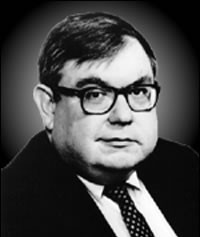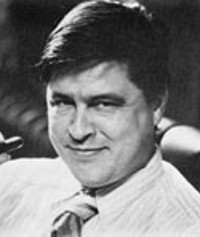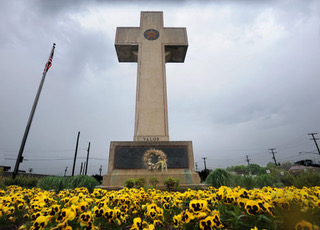 Samuel T. Francis
Samuel T. Francis
Championing
Western Civilization
and the great legacies of
Sam Francis and Joe Sobran
and their allies
 Joseph Sobran
Joseph Sobran
FGF NEWS
February 25, 2019

FGF Petitions Supreme Court to Keep Bladensburg Cross Standing:
Files Brief Against American Humanist Association
by Fran Griffin
President, Fitzgerald Griffin Foundation
Washington, D.C. — In keeping with our mission to preserve Christianity and the great traditions of Western Civilization, the Fitzgerald Griffin Foundation has filed a 32-page Amicus Curiae brief in the U.S. Supreme Court in the case of The American Legion v. The American Humanist Association to prevent the Bladensburg Peace Cross, a World War I monument to fallen soldiers, from being destroyed.
The American Humanist Association is determined to tear down the 40-foot Bladensburg Peace Cross, contending its Latin Cross shape violates the No Establishment Clause in the First Amendment.

The American Humanist Association is determined to tear down the 40-foot Bladensburg Peace Cross, contending its Latin Cross shape violates the No Establishment Clause in the First Amendment. This case has been working its way through the lower courts. In 2017, the federal Fourth Circuit Court ruled by a vote of 2 to 1 that the 94-year-old monument was impermissibly religious, based on religious tests in prior Supreme Court decisions – and that it should be torn down. (During the circuit court proceedings, one judge suggested mutilating the monument by cutting off arms of the cross.) The American Legion appealed to the Supreme Court, which agreed to hear the case. The High Court will hear the arguments on February 27. Our amicus brief supports the American Legion in seeking a reversal of the Fourth Circuit Court’s decision.
The amicus brief that has been filed by FGF and several other organizations urges the High Court to identify the original meaning of the No Establishment and Free Exercise texts. It is our contention that the true meaning has almost been lost in this last century of Supreme Court decisions. Missing from the American Legion briefing is an effort to learn what certain words, such as “religion,” meant in 1791 when the federal Bill of Rights was adopted. Thus far, the Supreme Court has failed to come up with a working definition of “religion,” even as they rule on every occasion that a particular monument or memorial is – or is not – a forbidden establishment of “religion.”
Last year, our amici attorneys, William J. Olson, Herbert Titus, and Jeremiah L. Morgan challenged the Court in another brief to address the constitutionality of the Bladensburg Cross Memorial by first defining “religion” as it was understood in 1791 when the First Amendment was ratified. Only by abiding by the fixed meaning and other canons of interpretation will the Court find a principled answer to the recurring questions raised by the two religion clauses.
During the circuit court proceedings, one judge suggested mutilating the monument by cutting off arms of the cross.
Fortunately, unlike the Court’s pro-abortion jurisprudence, there is no meaningful precedential barrier that could get in the way of a full court search for the original meaning of the phrase: “make no law respecting an establishment of religion, or prohibiting the free exercise of religion.”
The amicus brief that has been filed by FGF and several other organizations urges the High Court to identify the original meaning of the No Establishment and Free Exercise texts.
There was fierce leftist opposition to Judge Kavanaugh’s “originalist view that the Constitution ought to be interpreted according to the meaning of the words when the text was adopted.” The first judicial test of Justice Kavanaugh’s commitment to originalism will come with this case. Also, it will be his first opportunity to interpret the Constitution’s religion clauses.
Here is the history of the magnificent Bladensburg Peace Cross.
In 1918, bereaved mothers of 49 soldiers who perished in World War I began to raise money to build a memorial to their sons. Grieving family members and veterans enlisted architect John Joseph Earley to design a concrete and bronze monument on which the 49 names of the war heroes were to be engraved. The American Legion built and dedicated the memorial in 1925. It is a beautiful gravestone commemorating the lives of the fallen soldiers, whose bodies are buried in unmarked graves overseas.
Fortunately, unlike the Court’s pro-abortion jurisprudence, there is no meaningful precedential barrier that could get in the way of a full court search for the original meaning of the phrase: “make no law respecting an establishment of religion, or prohibiting the free exercise of religion.”
A bronze tablet at the base of the cross quotes Woodrow Wilson: “The right is more precious than the peace; we shall fight for the things we have always carried nearest to our hearts; to such a task we dedicate ourselves.” At the base of the monument are the words “Valor” “Endurance” “Courage” and “Devotion.”
The arms of the Latin cross are supported by unadorned concrete arches.
The first judicial test of Justice Kavanaugh’s commitment to originalism will come with this case. Also, it will be his first opportunity to interpret the Constitution’s religion clauses.
The Peace Cross is listed in the National Register of Historic Places. It is a prominent landmark near the small town of Bladensburg, Maryland. It was erected on private property but as the years went by, the state redesigned the intersection and it now stands on a government-owned median surrounded by state roads that are travelled by some 50,000 cars every day. The Maryland-National Capital Park and Planning Commission assumed maintenance of the Peace Cross in 1960.
In 2012, the American Humanist Association began its campaign to have the 40-foot Bladensburg Peace Cross demolished, claiming it was a religious symbol standing on public property. They are particularly offended that financial contributors of the memorial signed a pledge in 1918 which stated: “We, the citizens of Maryland, trusting in God, the Supreme Ruler of the universe, pledge faith in our brothers who gave their all in the world war to make the world safe for democracy. Their mortal bodies have turned to dust, but their spirit lives to guide us through life in the way of godliness, justice and liberty. With our motto, ‘One God, One Country and one Flag,’ we contribute to this memorial cross commemorating the memory of those who have not died in vain.”
Our amicus brief states that if the Fourth Circuit decision is allowed to stand – and this historical monument to our war dead is destroyed – the result could be the establishment of the religion of paganism in America.
Our amicus brief states that if the Fourth Circuit decision is allowed to stand – and this historical monument to our war dead is destroyed – the result could be the establishment of the religion of paganism in America. The brief describes how such a decision would fuel a pagan religion insurgency, particularly if the Bladensburg Cross is desecrated by having its arms removed to become a non-religious slab or pagan obelisk.
“Should the American people choose Paganism over Christianity, at least that would be the choice of the People,” the brief concludes, “but that choice should not be imposed by the judiciary, by taking the side of the non-Christian plaintiffs who seek to rid the landscape of crosses in favor of pagan symbols.” The brief calls on the courts to end their costly war on Christianity.
The brief describes how such a decision would fuel a pagan religion insurgency, particularly if the Bladensburg Cross is desecrated by having its arms removed to become a non-religious slab or pagan obelisk.
As mentioned above, the Court will hear the arguments of this case on February 27 with a decision to be announced in a few months. You can follow this and other cases aimed at securing Constitutional rights for all citizens at LawandFreedom.com.
Please help with the legal expenses and publicity for this historic and significant case by making a tax-deductible donation to the Fitzgerald Griffin Foundation. Thanks very much for your support!
###
Fran Griffin is founder and president of the Fitzgerald Griffin Foundation.
Or send a check to: Fitzgerald Griffin Foundation344 Maple Avenue West, #281
Vienna, VA 22180
1-877-726-0058
publishing@fgfbooks.com
Or call toll-free at 1-877-726-0058 to donate by phone. For more information, write to Fran Griffin at fgf@fgfBooks.com